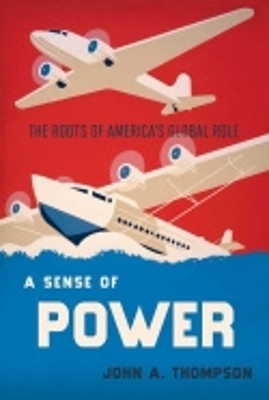
A Sense of Power
Cornell University Press (Verlag)
978-0-8014-4789-1 (ISBN)
Why has the United States assumed so extensive and costly a role in world affairs over the last hundred years? The two most common answers to this question are "because it could" and "because it had to." Neither answer will do, according to this challenging re-assessment of the way that America came to assume its global role. The country’s vast economic resources gave it the capacity to exercise great influence abroad, but Americans were long reluctant to meet the costs of wielding that power. Neither the country’s safety from foreign attack nor its economic well-being required the achievement of ambitious foreign policy objectives.
In A Sense of Power, John A. Thompson takes a long view of America’s dramatic rise as a world power, from the late nineteenth century into the post–World War II era. How, and more importantly why, has America come to play such a dominant role in world affairs? There is, he argues, no simple answer. Thompson challenges conventional explanations of America’s involvement in World War I and World War II, seeing neither the requirements of national security nor economic interests as determining. He shows how American leaders from Wilson to Truman developed an ever more capacious understanding of the national interest, and why by the 1940s most Americans came to support the price tag, in blood and treasure, attached to strenuous efforts to shape the world. The beliefs and emotions that led them to do so reflected distinctive aspects of U.S. culture, not least the strength of ties to Europe. Consciousness of the nation’s unique power fostered feelings of responsibility, entitlement, and aspiration among the people and leaders of the United States.
This original analysis challenges some widely held beliefs about the determinants of United States foreign policy and will bring new insight to contemporary debates about whether the nation should—or must—play so active a part in world politics.
John A. Thompson is Emeritus Reader in American History at the University of Cambridge. He is the author of Reformers and War: American Progressive Publicists and the First World War and Woodrow Wilson: A Profile in Power.
Introduction: The Problem
Power as an Explanation
Security as an Explanation
Economic Interests as an Explanation
Missionary Ideology as an Explanation
Seeking an AnswerChapter 1. A New Sense of Power
The Expansion of Foreign Policy
The Limits of Expansion
Explaining the Limitations
The Sense of PowerChapter 2. Advance and Retreat, 1914–1920
The European War and American Opinion
Wilson's Initial Policy
The Impact of the U-Boat
Increasing Involvement and Commitments
Going to War
Fighting the War and Preparing for Peace
The Limits of Power: The Paris Peace Conference
The Failure to Join the League of NationsChapter 3. A Restrained Superpower, 1920–1938
The Character of U.S. Foreign Policy in the 1920s
The Apogee of IsolationismChapter 4. Lessening Restraint, 1938–1941
The Erosion of Neutrality
The Impact of the Fall of France
Explaining the Move toward InvolvementChapter 5. Full-Scale Involvement, 1941–1945
Wielding Global Power
The Discrediting of "Isolationism"
What Kind of Internationalism?Chapter 6. Assuming "the Responsibilities of Power," 1945–1952
The Commitment to Western Europe
Doing More with MoreConclusionNotes
Index
| Erscheint lt. Verlag | 4.12.2015 |
|---|---|
| Verlagsort | Ithaca |
| Sprache | englisch |
| Maße | 155 x 235 mm |
| Gewicht | 907 g |
| Themenwelt | Geschichte ► Allgemeine Geschichte ► Neuzeit (bis 1918) |
| Geschichte ► Allgemeine Geschichte ► Zeitgeschichte | |
| Geisteswissenschaften ► Geschichte ► Regional- / Ländergeschichte | |
| Geschichte ► Teilgebiete der Geschichte ► Militärgeschichte | |
| Sozialwissenschaften ► Politik / Verwaltung ► Europäische / Internationale Politik | |
| ISBN-10 | 0-8014-4789-5 / 0801447895 |
| ISBN-13 | 978-0-8014-4789-1 / 9780801447891 |
| Zustand | Neuware |
| Haben Sie eine Frage zum Produkt? |
aus dem Bereich


